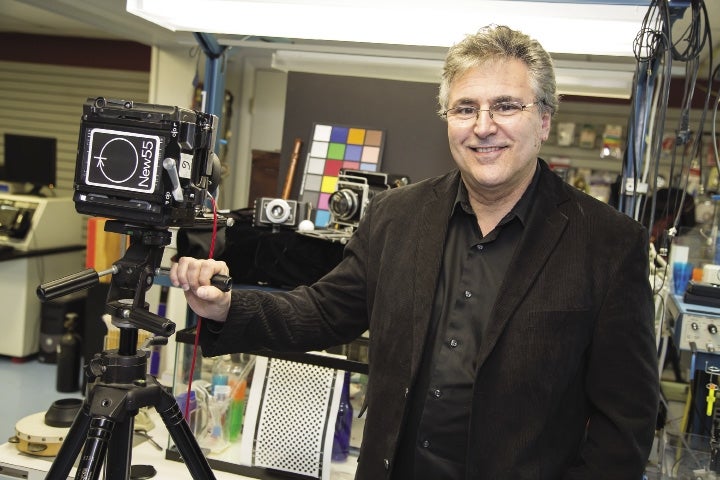Kickstarter offers funding jolt to Central Mass. ventures
 PHOTO/MATT VOLPINI
With an idea and $400,000 in Kickstarter funds, Robert Crowley's Ashland company, Soundwave Research Laboratories, is working to bring an instant, black-and-white film product to market.
PHOTO/MATT VOLPINI
With an idea and $400,000 in Kickstarter funds, Robert Crowley's Ashland company, Soundwave Research Laboratories, is working to bring an instant, black-and-white film product to market.
Robert Crowley didn't think there was enough support to re-create the recipe for large-format instant film that was lost with the fold of Polaroid, but a Kickstarter campaign he was urged into undertaking by several online supporters proved him wrong when more than $400,000 was pledged for research and development.
The product, New 55 Film, recreates the 4-inch-by-5-inch instant, black-and-white film made famous by photographers such as Ansel Adams. But after four years of research using his own money, Crowley was tapped out. That's when supporters persuaded him to undertake a Kickstarter campaign so they could fund the project.
“We presented it not as a presale of anything, but as a way of developing the means to manufacture and have a new business that would produce film,” Crowley said of the project, which was pursued by his company, Soundwave Research Laboratories of Ashland. “We had to prove there is real strength for this.”
Kickstarter has been known for funding one-time production runs of products such as books, electronics, games and music albums. The service uses Internet-based funding, also known as crowdfunding, to allow a large number of individuals to fund various projects at multiple levels, each earning investors a reward such as a T-shirt or a product from an early production run.
The crowdfunding method has been expanding from its initial focus to cover a larger array of projects. Today, there are crowdfunding sites specifically for medical research (Consano.org) and other academic research (such as Experiment.com, Petridish.com, and Rockethub.com). Kickstarter's range has expanded to encompass the launch of entire companies as well as to fund research and development.
The owners of Medusa Brewing Co. in Hudson, which opened in March, raised $27,491 on Kickstarter to complete a renovation of their brewery site. While the Kickstarter funds accounted for less than 5 percent of the owners' startup money, it came at an important time.
“We weren't planning on Kickstarter. It was not a part of a business model, but it covered our overages,” co-founder Keith Sullivan said.
Ethical concerns?
However, Dave Howland, who also used Kickstarter in launching 3Cross Brewery in Worcester, feels the financial support generated through Kickstarter carries ethical concerns over whether a for-profit company should solicit funds that are like charitable contributions.
“They're asking for a donation, essentially,” Howland said, explaining that it's important to offer real value in the money that comes in through Kickstarter.
Howland used his Kickstarter campaign to help distribute his brewery's merchandise to reward campaign supporters. While he feels the rewards can be valuable enough that the backer's investment becomes worthwhile, there's still the question of whether it's appropriate to help fund a for-profit business with donations.
While Sullivan acknowledged that this could be a concern, he saw Medusa's Kickstarter as providing an outlet for community support that had already been building for the brewery. While the markup on some of the merchandise offered in the Kickstarter, such as $20 for a Belgian glass now sold for $6, could be considered a donation, this was support people chose to give.
Kickstarter also boosted publicity for these companies. Just using the Kickstarter name can help build the base for a project, Sullivan said.
Filling in funding gaps
Where conventional funding stops being viable is where crowdfunding can really shine, Crowley said. Stuart Etsy has launched a $25,000 Kickstarter campaign to raise funds to relaunch his condiment company, Dr. Gonzo's Uncommon Condiments, of Worcester, which was open from 2002 to 2011. Not owning a house or other capital eliminated the ability to seek a small business loan, he said.
“Traditional routes of financing with small business loans didn't seem to work without the leverage of major collateral. We had friends and family dip into their savings that helped propel the project but we never found the appropriate 'angel' investor,” Etsy said.
These alternative funds can also benefit established businesses, Crowley said. His New 55 campaign wasn't about funding the production of film, but rather research and development toward it. There is no guarantee of success, but Crowley hopes a final production plan will come to fruition in the next few months, leading to an initial, mass-produced run of film.
That's the exciting possibility crowdfunding offers small and medium-sized companies, he said. While large companies have capital to float certain ideas or hold special pre-orders to gauge interest in new products and then scale production accordingly, smaller companies lack liquidity but arguably have more flexible and unique ideas. Crowdfunding can be used to raise money to push these ideas through development.
“There isn't an alternative funding method rather than putting down capital and committing to a business plan, so this fills the gap in many high-risk endeavors,” Crowley said. “There is no alternative to this.” n









0 Comments